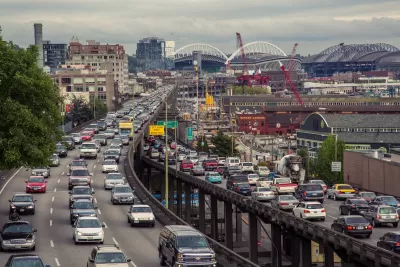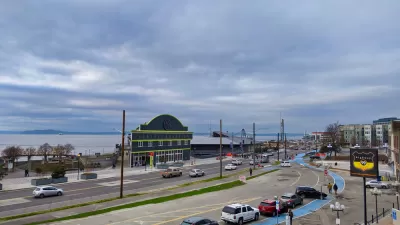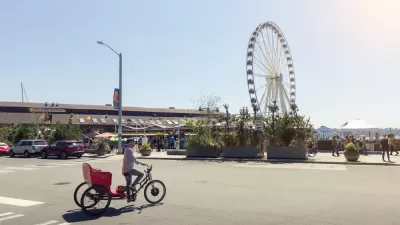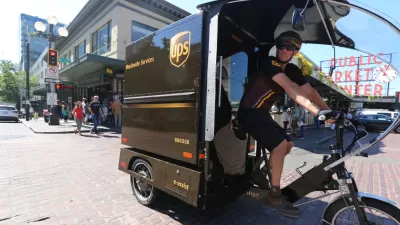Congestion pricing is a popular subject of conversation in Seattle, even if the idea hasn't yet proven popular with voters. The city is looking for ways to lead on climate change by reducing emissions from transportation.

Katie Wilson pens a two-part opinion piece about the difficult political job of positioning a city as a climate leader—in this case the city is Seattle, and the politician is Mayor Jenny Durkan, who called in 2018 for the city to study congestion pricing as a key piece in a plan to reduce the city's emissions from transportation.
Wilson writes: "Does Mayor Jenny Durkan have a vision for reducing emissions from transportation? In fact, last April she announced a big idea that many transportation and climate advocates found surprising and exciting: congestion pricing — charging fees for driving that more accurately reflect real social and environmental costs."
Consultants released the study in May 2019, over a year later, with strong cautions about the difficulties of implementing a congestion pricing without overburdening low-income populations and groups that have traditionally been marginalized by planning decisions.
Wilson expresses some skepticism that Durkan is willing to expend the political capital to get a congestion pricing plan a cross the finish line. "If Durkan is serious about overcoming this obstacle to her big idea, her record so far doesn’t show it. No doubt the mayor inherited some real difficulties, but a series of major setbacks has given advocates good reason to be frustrated."
Contributing to Wilson's skepticism is a long list of projects intended to be funded by the Move Seattle Levy, but which have fallen by the wayside as that money has fallen short of promises.
With the diminishing scale of that effort, in mind, Wilson asks the question: "Suppose congestion pricing fails to materialize. What’s left of Durkan’s vision? When she announced her climate agenda last April, one more transportation idea made the cut: electric vehicles."
Part two of Wilson's screed focuses on positive action toward a less carbon intensive transportation system, including four recommendations:
- Prioritize "transit, biking, walking, and rolling"
- Go big on bus service
- Challenge employers to step up by subsidizing transit, offering bike parking, and charging for parking
- Integrate land use with transportation by building a lot of affordable housing near transit lines.
In separate article on the same subject of cleaning up the city's transportation systems, Daniel Malarkey focuses on the potential for congestion pricing to cut traffic and generate revenue for other forms of mobility that would benefit low-income residents of Seattle.
In yet another article, Doug Trumm reports that ride-hailing company Uber recently released its own study analyzing the effects of a potential fee on ridehailing services for traffic in Downtown Seattle.
Trumm summarizes the key findings from the study: "Peak car trips would drop 7%, and automobile travel times to and from downtown at peak times would drop 30% with dynamic tolling topping out at $3.80 in afternoon rush, under the study’s projections. More importantly, pollution would drop, transit ridership would increase 4%, and the city would generate at least $130 million in annual revenue."
The ride-hailing study was built on the framework of the city's study released in May.
FULL STORY: Durkan can't make Seattle a climate leader without fixing our commute

Trump Administration Could Effectively End Housing Voucher Program
Federal officials are eyeing major cuts to the Section 8 program that helps millions of low-income households pay rent.

Planetizen Federal Action Tracker
A weekly monitor of how Trump’s orders and actions are impacting planners and planning in America.

Ken Jennings Launches Transit Web Series
The Jeopardy champ wants you to ride public transit.

California Invests Additional $5M in Electric School Buses
The state wants to electrify all of its school bus fleets by 2035.

Austin Launches $2M Homelessness Prevention Fund
A new grant program from the city’s Homeless Strategy Office will fund rental assistance and supportive services.

Alabama School Forestry Initiative Brings Trees to Schoolyards
Trees can improve physical and mental health for students and commnity members.
Urban Design for Planners 1: Software Tools
This six-course series explores essential urban design concepts using open source software and equips planners with the tools they need to participate fully in the urban design process.
Planning for Universal Design
Learn the tools for implementing Universal Design in planning regulations.
Ada County Highway District
Clanton & Associates, Inc.
Jessamine County Fiscal Court
Institute for Housing and Urban Development Studies (IHS)
City of Grandview
Harvard GSD Executive Education
Toledo-Lucas County Plan Commissions
Salt Lake City
NYU Wagner Graduate School of Public Service





























